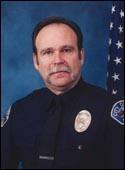A somber sense of loss swept through Orange County Tuesday, May 28, as an estimated 1,400 mourners gathered to bid farewell to Terry L. Fincher, veteran Brea police detective who was killed in the line-of-duty May 22, 1996.
A procession of more than 300 vehicles, stretching almost three miles, escorted Fincher’s body from the Fullerton church where Services were held to the Whittier cemetery where he was laid to rest. Fincher, 48, who dedicated 16 years to the Brea Police Department, was lauded as a man of integrity, sharp police instincts and tenderness.
“If the bad guy was bigger than you, you wanted Terry to watch your back,” said Pastor Steve Biffle, a close family friend. “If your life was broken, you wanted Terry by your side.”
Representatives of many law enforcement agencies – from Orange County to Fincher’s hometown Chino to Los Angeles – attended the funeral at the Evangelical Free Church.
Hundreds of officers affixed black ribbons to their badges to symbolize the loss of a colleague, he second Brea officer to die in the line-of-duty in the department’s 81-year history.
It was poignant that Fincher’s funeral came the day after Memorial Day. The officer had served with distinction during the Vietnam War.
Fincher was killed when, as other officers shouted warnings, a freight train struck him during a search along the tracks for a baseball bat believed to have been discarded near the railroad tracks after an attack. As another officer waved his arms and shouted a warning, Fincher apparently took a step away from the approaching train, police said.
But he was sucked into the side of the locomotive by the pressure of the passing train, which was moving downhill about 50 mph, Brea police investigator Bill Hudson said. Fincher was hurled down an embankment, where he was pronounced dead.
The accident occurred about 8.30 a.m. when Fincher and several other officers were searching the area near Esperanza Road and Hickory Drive. Hours earlier, police had arrested four young men on suspicion of following a couple from a bar and beating them with a bat near some railroad tracks.
The detective had been combing a rocky area near the tracks with his back to the oncoming train, police said. The train was just rounding a turn, and the view was partly obscured, said Mike Martin, spokesman for the Burlington Northern Santa Fe Co.
The train’s crew spotted the detective walking on the tracks when the train was about a third of a mile away, Martin said. By the time crew members hit the brakes, they were about a sixth of a mile way, he said.
“There’s not a lot of time to react when you’re traveling at around 75 feet per second,” Martin said. The train, with two engines pulling 19 cars, originated from Kansas city and was heading to Los Angeles Because it was heading downhill, the train might have been less noisy than usual, Martin said.
“Only a locomotive could take out this super cop,” Biffle said during the funeral service.
Fincher began and ended his law enforcement career with the Brea police. Over the course of his career, he worked in many aspects of law enforcement, from motors to homicide, checks and fraud, burglary, crime scene investigations and the Special Enforcement Detail.
He was one of the founding members of Brea’s Peer Counseling and Crisis Intervention Team. He was a member of the Hostage Negotiation Team and Tactical Arrest and Containment Team (TAC). He was also the department’s sign language interpreter. As he once said, “I want to learn it just in case we ever need it.”
He was awarded the department’s Medal of Honor in 1967 and was held in high regard by fellow officers, who voted him as Associate of the Year in 1980 and Officer of the Year in 1981.
“In my heart, Terry will never die,” said Brea Police Chief William C. Lentini, who called the funeral service a celebration of Fincher’s life and achievements. “A loss of one is a loss for us all.”
In a poem, friend and partner Det. Jerry Brakebill told the legacy Fincher left “For nothing loved is lost… for he was loved so much.”
During the funeral service, time seemed suspended as the funeral procession slowly moved to the burial site at Rose Hills Memorial Park in Whittier. Traffic along Brea Boulevard and the Orange and Pomona freeways was halted for miles.
But not even Biffle – despite his storehouse of anecdotes about the 1957 “hot-rod” Chevrolet Fincher had as a high-schooler, or his habit of singing over the phone to his grandchildren – could fully transcend the profound sorrow that permeated the vast sanctuary during the service.
“Terry, we’ll miss you … we’re so very, very proud of you,” Biffle concluded with a crack in his voice, nodding toward the flag-draped coffin bathed in a bright spotlight at the foot of the altar.
The mourners were a somber mix of civilian friends and police officers from more than three dozen Southern California jurisdictions. Nineteen of 32 teachers at Briggs Elementary School in Chino, where Fincher’s widow, Brenda; is a secretary, arranged for substitutes so they could attend the service.
The church became quiet as all 110 of Fincher’s fellow Brea officers filed down the main aisle, the only sound coming from the squeaks of their black dress shoes – burnished to a spit-polish shine – echoing through the chamber. The Brea officers made no attempt to hide their sadness.
Brakebill halted several times before he was able to complete the poem in Fincher’s memory, choking in particular when he said Fincher had gone to a place of comfort where there are no dates or years.”
At the burial service, a fresh breeze blew through the crowd just as four police helicopters flew over. Six pallbearers then removed the American flag that covered the wooden casket. They stood rigidly, neatly folding the flag which Chief Lentini delivered to Fincher’s wife, Brenda, who was composed and kept her eyes lowered. She and her two daughters ended the ceremony by approaching the casket, upon which each gently placed a rose and a soft kiss.
Brea police pastor Doug Green read the 23rd Psalm. The seven-member police rifle squad fired a 21-gun salute, the sound reverberating off the nearby hills of Rio Hondo College, where Fincher attended police academy before joining the Brea force.
Then bagpiper Robert Hackney played a last melody, Brea police buglers Larry Hernandez and Tim Shevlin sounded taps, and the mourners looked skyward for a helicopter fly-by salute from the Orange County Law Enforcement Regional Air Support.
Simultaneously, a freight locomotive from the adjoining Union Pacific tracks sounded its horn, a haunting reminder to some, of Fincher’s death but a tribute however ironic – to the fallen officer.
Silence fell and the crowd melted away.
Besides his wife and daughter, Edie, 23; Fincher is survived by his son, Erik, 25; and step children, Melissa Scott, 16; and Nathan Scott, 20. Fincher and his wife Brenda resided in Chino. He also has two grandsons, Benjamin and Brandon.

